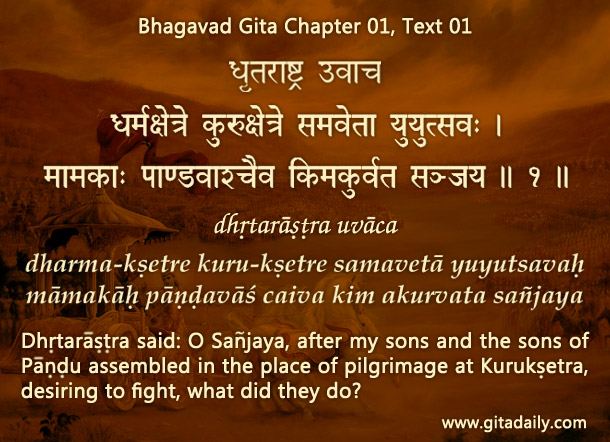The Bhagavad-gita is, as its very name indicates, God’s message in the form of a song. Why does the Gita begin with the words of Dhritarashtra?
To answer, we might look at the narrative framing. The Bhagavad-gita is a part of the Mahabharata, which describes the events on the Kurukshetra battlefield through a particular frame: narration to Dhritarashtra by his assistant, Sanjaya. And Krishna’s delivery of the Gita to Arjuna is the first major event of the first day of the Kurukshetra war. Understandably then, the Gita’s core message is preceded by a question from Dhritrashtra about the happenings at Kurukshetra (01.01).
Still, such a textual explanation leaves a key question unanswered: Why could the Gita not have started with the battlefield setting itself, maybe with a description of Krishna? It seems odd that a sacred book that is often recited begins with a character who is far from sacred? Dhritarashtra might not be the Mahabharata’s active villain, but he is certainly no hero. He is the passive villain who is the enabler of the active villain: his son Duryodhana.
The answer might lie in Dhritarashtra’s name, whose most common meaning also reflects his mentality: ‘one who holds on to (dhrita) a kingdom (rashtra)’ — that is, an attached king. His attachment to the kingdom had triggered the many events that culminated in the Kurukshetra war, wherein the Gita is spoken. Though he got to hear the Gita, it didn’t change his heart — at least not till his hope for enjoying the kingdom was irrevocably frustrated.
Through Dhritarashtra, the Gita provides a signal example of the mentality to be avoided by those who want to benefit from its empowering, transforming, liberating wisdom. Seen in this light, the Gita’s starting with him is apt, poetically and philosophically.
One-sentence summary:
The Gita begins with Dhritarashtra not just for narrative purposes, but also for instructive purposes: to illustrate the mentality that can make us unreceptive to its message.
Think it over:
- What is the narrative purpose for the Gita’s starting with Dhritarashtra’s words?
- Why might the Gita’s starting with Dhritarashtra’s words seem odd?
- How is such a start not odd, but apt?
***
01.01: Dhritarashtra said: O Sanjaya, after my sons and the sons of Pāndu assembled in the place of pilgrimage at Kurukshetra, desiring to fight, what did they do?
To know more about this verse, please click on the image


Hare Krishna,
prabhu ji, does it mean that Dhritarashtra may be an aspect of ourselves when we think that – ohohooo, this body is mine, I will enjoy it forever, or this position is mine, I will be there forever or whatever, this is mine, I will not give up on this …? That is on a personal level? Because each one of us is at some point blind to some aspect of reality…?
…As in the paddy field the unnecessary plants are taken out, so it is expected from the very beginning of these topics that in the religious field of Kuruksetra, where the father of religion, Sri Krishna, was present, the unwanted plants like Dhrtarastra’s son Duryodhana and others would be wiped out and the thoroughly religious persons, headed by Yudhisthira, would be established by the Lord. This is the significance of the words dharma-ksetre and kuru-ksetre, apart from their historical and Vedic importance.
Thank You very much.
Ys,
Yes, Dhritarashtra is historical and can also be seen as a non-literal representation of the attached part within us.